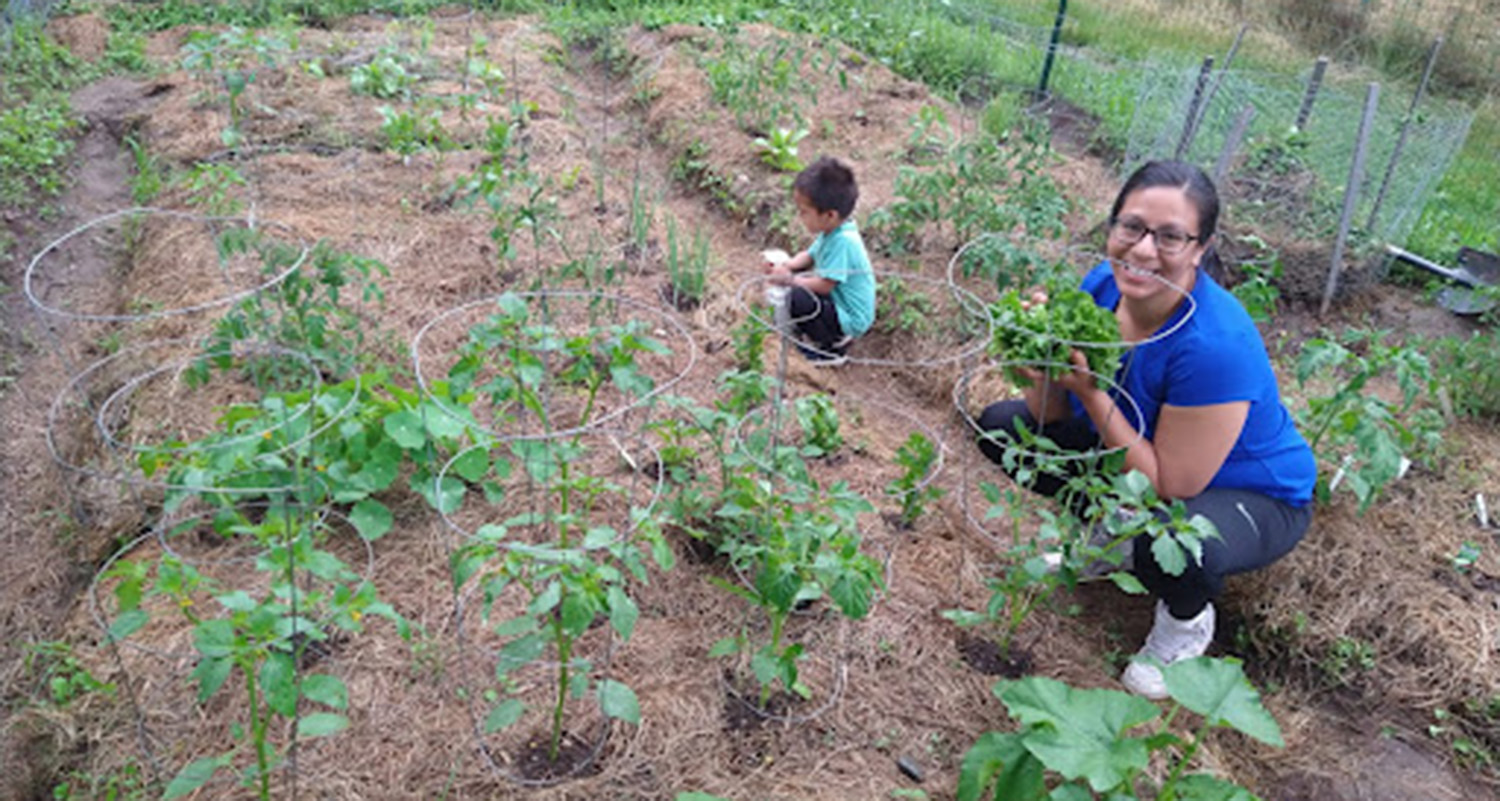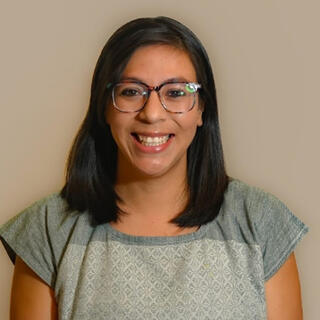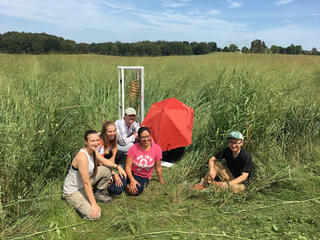
Our graduate students and postdoctoral researchers play an enormous role in the transition to a sustainable, resilient, and affordable energy future that is centered on social and economic equality. From lab experiments to field work to classrooms, these leaders of today and tomorrow are our catalysts for energy discovery.
In this series, we learn more about what inspired these talented researchers, what brought them to their field of study, and the questions that drive their work at the Great Lakes Bioenergy Research Center (GLBRC).
Today we spoke to Violeta Matus Acuña, a postdoctoral researcher in the Soil Biology and Ecology Lab with Dr. Lisa Tiemann at Michigan State University. Violeta is from Mexico City, Mexico and studied Soil Ecology for her Ph.D. at the University of Michigan. She provides insight on the importance of resilience, relearning, and diversity.
“There are some people who know what they want, and there are some who need to grow and aren’t so sure.”
- Violeta Matus Acuña
Tell me a little bit about your roots, where are you from?
I’m from Mexico, specifically the capital Mexico City. My parents immigrated from small towns to Mexico City before having me, so I consider myself a mix of different Mexican cultures.
What first sparked your passion for science & research?
I have an older brother, and when we were younger he always knew what he wanted. Since he was really young he knew he wanted to be an engineer, and I was the opposite. At first I wanted to be an astronaut, teacher, everything. I never had a really clear path until I grew up a bit more.
My father is a biologist, so he used to take me on field trips where we would travel around Mexico and I loved it. I remember I told him I wanted to be a biologist, and he looked me in the eyes and told me not to do it.
He said that there were not enough jobs and that it’s hard to get a good job in Mexico as a biologist. I was shocked, so I searched for something different and I majored in Chemistry.
Can you describe your academic path?
At the end of my undergraduate major, I had the option to join industry or do a research thesis, so I joined a lab that was trying to understand bacterial traits in Mexico. I started doing a small internship that became my thesis and I loved it. After that, I decided I wanted to pursue a master's degree.
I joined the master's program at the Institute of Biotechnology, outside of Mexico City. I started working with Cry toxins, which are bacterial proteins that kill some different agricultural pests, but I didn't like it. When I was finished with my masters I thought I would start something more related to plants, soil, and understanding how that biology works. I had a friend that was working with Esperanza Martinez, a really important Principal Investigator at the National Autonomous University of Mexico.
When I went to her, we started talking about projects and ideas and I was super excited, so I decided to join her lab as a PhD student. I got married in the middle of my PhD, and my husband finished his a year before me and decided to do a postdoc at the University of Michigan.
Once I finished my PhD, I decided I would also do a postdoc, but the University of Michigan had a small agriculture department. When I learned about the position at Michigan State, I thought it was a dream. I applied and now I’m so excited to be here.

What motivated you to keep chasing your passions?
My PI from the PhD. She was so passionate about what she did, you could feel it. One time someone interviewed her and they asked, “what is your favorite hobby?” And she said reading papers. My friends and I were all like, “what?”, so she was one of the women who inspired me to follow my career.
Even though my dad told me not to go into biology or do a PhD, my parents were still like “okay, if this is really what you want we are going to support you and everything.” My husband is also in this field so he understands the good, the bad, and the horrible things that happen. Growing with someone who is doing something similar to you has always been very helpful.
What excites you about Tiemann’s Lab or Michigan State in general?
When I learned I was getting this position, I was really excited to learn more techniques and knowledge from Lisa to complement my work. Lisa was also really interested in soil food webs, which is not that common in plant research. She has a lot of knowledge about soil and biochemistry as well.
My previous PI was awesome, but she didn’t have too much experience in that. She was working with bacteria all her life, so I had to do most of my work by just reading papers and figuring it out. I was the first one to isolate nematodes, a type of worm, from soil in my PhD. I remember going to Home Depot and building my own set of equipment back then, so I was excited to join a lab that had previous knowledge and could give me some guidance.
I was also excited to join Michigan State because I knew it was a big university in agricultural research, and they have a really big infrastructure on greenhouses, seeds, different microorganisms, libraries, and other stuff. It was a whole new set of tools available for me.
Can you tell me about your recent research and publications?
For my PhD I have two major publications. One was trying to understand how nematodes will affect bacterial communities, especially bacterial feeding nematodes. When I made my proposal, I wanted to isolate nematodes and study them in the lab. People asked if I was really going to be able to do that, and I didn’t know, but I said I would try. And it was so easy, you get a little bit of soil and there are thousands of them.
We found the addition of bacteria like Rhizobium combined with the nematodes promoted more corn growth than the bacteria by itself. This can help the plant produce more auxins, beneficial molecules that help plants grow.
My second project was inspired by my love of diversity. One of the things I like the most about corn in Mexico is its ability to adapt and grow everywhere. Every farm in Mexico has different conditions, so there are multiple corn varieties. I was interested in what would happen if we put them all together in one soil to see how that shaped fungal communities, especially if that had correlations with mycorrhizae, the fungi associated with roots. I also wanted to check other communities like nematodes, protozoa, and others. The interesting thing was that in fact I observed significant differences in fungi communities associated with different corn varieties.
“I had to relearn about the world we have outside. I get mad when people just call it dirt. It’s soil, and there’s a whole and important ecosystem there. There’s different protozoa, nematodes, and even microfauna essential for plant growth.”
Violeta Matus Acuña
How does your work impact larger themes in science, such as sustainability?
I have always been concerned about climate change. Now that I have two kids, it’s way more concerning. So, it is more important now than ever that I try to create solutions with my research. One of my focuses is trying to recycle everything. It’s insanely crazy how large-scale agriculture can strip everything away from the soil and then try to repair the whole damage by only adding fertilizers.
As I continue my research, I see there needs to be more biodiversity, not only in bacteria and fungi, but all sorts of nematodes, microfauna, and all organisms that are doing something good for the soil.
It would be helpful for everyone, especially considering all the fertilizers that leach into rivers causing pollution problems. We want universal answers, but that won’t work. There are different ecosystems, soils, people, and cultures so everyone has to try to figure that out before trying to do any soil treatments.
What part of your current research brings you the most joy?
Growing the plants, adding different things and seeing how they change. It is amazing. Seeing how a tiny bacteria can change so many things in a plant, and how a nematode can change so many things as well. It’s shocking.
How do you spend your time outside of the lab?
When I joined Lisa Tieman’s lab, some of my lab mates told me about renting a garden plot for the summer, so I joined and last year I got my first lot.
Then I started my own compost and used it in my plants. I got a crazy amount of tomatoes. It felt so natural. I love working there and seeing my plants grow.
I also used to read and exercise a lot. I ran and ran and ran until I had my kid. But now I think my favorite hobby is running around with him. The best thing about being a parent is that you’re able to play a game like a child and no one will judge you.

If you could teach non-science students one thing about soil ecology, what would it be?
I would choose biodiversity. How complex soil can be, how many functions a gram of soil can do, like degrading material and allowing plants to grow from that. Soil is really valuable and there are so many things growing in there that we heavily depend on.
What previous skills are you grateful for in terms of preparing you to be a postdoctoral researcher?
I think resilience and tolerance to frustration. Those are two things I think anyone who is going to do a postdoc or have a life in academia needs. It’s a highly competitive environment. There are amazing people doing huge things out there and it’s hard to not compare to them.
It’s better to focus on teamwork and not on competition. This allows you to do more and be more comfortable with yourself. You get the techniques and the knowledge from reading papers and doing experiments one, two, three and four times. If you learn how to tolerate the failure of your first experiment and try for a second one, you will succeed.
“If there’s someone smarter there, which there probably is, there are genius people everywhere, the best thing you can do is learn from them.”
Violeta Matus Acuña
What advice do you have for future researchers?
The thing about academia is they always show you the best. They show you the publications, the awards–everything. But all the failures are not there, they aren’t on the papers. Most of us have a lot of failures. Coming from Mexico, I always felt like I’m not good enough. Studying in the USA at these big universities was really stressful and it gave me a lot of anxiety, so my advice is to just do your work, learn, and ask for help. Trying to pretend that you know everything and that you are the best of the best didn’t work for me.